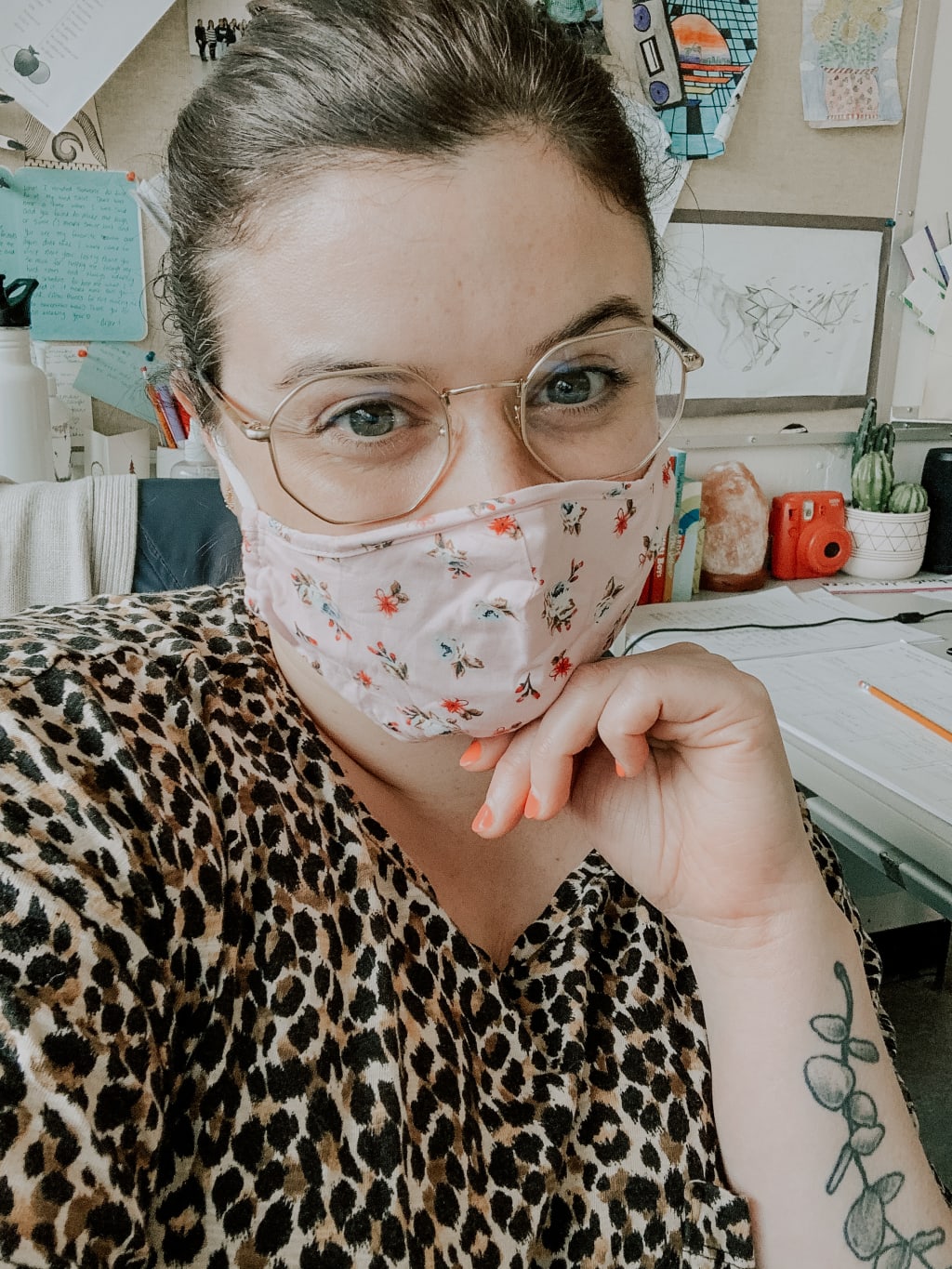Masking and Unmasking in the Classroom
How teaching middle school convinced me to out myself as an adult with ADHD in the workplace

Each morning, around halfway through my commute, my Ritalin kicks in. Today is no different. I'm exhausted; last night, I convinced myself it was a good idea to stay up late listening to a podcast. I've had three cups of coffee but the only result is a hollow ache in my stomach.
As I cross the wide, four-lane bridge that connects my community with the one I teach in, everything becomes a bit clearer. The familiar wash of calm comes over me as my brain calibrates for the day ahead. This morning, a crisp March sun peaks over the mountains, setting the surface of the river ablaze with coral specs of light.
When I first started teaching, I never imagined telling my students about my struggles with ADHD and anxiety. I never imagined writing publicly about it, either.
*
Growing up, I was a difficult kid. I pushed people, especially the adults around me. I entered rooms in full-speed monologues, unaware of the conversations already taking place. Conversations were a never-ending slew of interruptions and apologies. My brain was always two-steps ahead of everyone around me and I felt unable to stop myself from finishing my family members' sentences, successfully or not. This would have been fine, had I been blissfully unaware of the way my speedy way of speaking impacted the people in my life. Unfortunately, this couldn't be further from the truth.
As a kid, I was viscerally aware of the way I bulldozed friends and family in conversations. It was as though I was watching it all happen in slow motion from a viewing booth, hands tied. I would watch as my family members stiffened with every interruption, the way their eyes met one another while I prattled on, filling the room's negative space up with my ideas. More than once, people yelled at me, not believing I wasn't able to stop myself. Now, I know that this tendency towards verbal diarrhea is a symptom of ADHD. Growing up, I thought it was a flaw in who I was as a person.
When I finally begged my parents to put me on Ritalin in the ninth grade, I had had enough. I was tired. Every semester, I brought home report cards that said some variation of the same thing:
Erin is a bright young woman. She struggles with turn-taking and lacks focus.
Erin could get 'A's if she wanted to, but she doesn't apply herself.
By the time I reached Grade 9, the frustration my family felt was nothing compared to the deep disappointment I had developed towards myself. I forgot homework, deadlines, social events so frequently I had stopped trusting my own memory. My constant talking had become a running joke amongst my peers; no one wanted to sit beside me during study breaks for fear I would chat them into a terrible grade. My teachers looked tired, constantly asking me to look towards the front of the room, to raise my hand before speaking. My parents were continuously switching between compassion and dismay at my seeming lack of any organizational skills. My father often joked that he could track my daily activities based on the trail of objects left strewn around the house: a half-eaten pizza pop on the kitchen counter, a damp towel left on my bedroom floor as though I had simply stepped out of it and wandered away, a curling iron still sizzling into the ceramic ridge of the bathroom sink. It was as though my entire existence was an endless slew of half-finished tasks and abandoned ideas.
The first time I took ADHD medication, I cried for an hour. I was so happy. I could trust myself for the first time. I didn't need to scribble every passing idea or intention on a sticky note, or tell my sister to remind me to set my alarm. I was suddenly a reliable narrator in my own life. The world felt still and calm. I could finally take a breath. I could pause and think before speaking. In terms of my self-esteem, though, the damage would take years to heal.
*
Looking at my classroom, you wouldn't guess it belonged to an adult with severe ADHD. Other teachers often comment on the way that the spaces between my posters appears measured. Labeled bins sit in perfect symmetry along the back window ledge, each one filled with color-coded worksheets. It's no accident that my room looks this way.
One of the biggest lessons I've learned from my years struggling with ADHD symptoms is that I cannot be productive when my space is cluttered. I need clear surfaces, right-angles, locations for every object, no matter how insignificant.
For years I didn't talk about my ADHD with my students or my colleagues. I worked hard to stay on top of deadlines. I made calendars. I set alarms and reminders in my phone, designed to go off throughout the day and stop me from letting my colleagues down. On the outside, I seemed like I was doing great as a new teacher. Internally, I was a mess. Every day, I went to work terrified I would miss some deadline or forget to set a second or third alarm. Twice, I got to work only to discover I'd left my laptop at home. Once, I forgot to triple check my alarm and slept through the first block of the day.
My students could tell I was different. I was easily distracted--it only took a few classes for each new batch of kids to discover they could sidetrack the topic of a lesson with ease by asking questions or bringing up current events. I had a hard time listening to students' comments or questions when anyone was speaking or rustling paper. Noises from passing traffic would enrage me and cause me to restart entire lectures. Ambient noise drove me insane. I would leave the room impulsively, in search of the source of rogue auditory stimuli.
In my fourth year teaching, I started a masters program in educational psychology. One of the first courses I took was on autism and other developmental disabilities. I was shocked to hear, in the second week of the course, that ADHD is now considered a developmental disability. I had grown up convinced that I would eventually outgrow my symptoms. I had internalized a lot of shame over the fact that I still felt frazzled, unable to keep track of time in the way my friends seemed to, unable to ignore my impulses to start and abandon new projects at warp speed. Suddenly, it became obvious to me that my ADHD wasn't something I had experienced; my ADHD is who I am. It is the structure of my brain, the lens through which I view and interact with the world.
*
This year, I have started to be more open with my students. I talk to them about the way my mind works a bit differently. I tell them that it's hard for me to picture the future and make sense of deadlines. I tell them I get frustrated with myself. I tell them when I've lost my train of thought and admit when I'm wrong. I show them how I organize my calendar and use my phone to set reminders. I tell them that it's okay for our brains to work differently and that we can all be successful in the world once we accept who we are and find systems that work.
When I was a young girl, I didn't have teachers who talked openly about their struggles. I thought the world was filled with people who knew how to stay focused and organized. I'm hoping that by being open about who I am, I might help another kid like me feel a little less alone.
About the Creator
Erin Eliza
I am a queer educator, writer, yoga instructor, and animal petter living in the PNW. I write about ADHD, teaching, yoga, and trauma recovery. I teach yoga on IG Live Monday - Saturday @erindoesyogaeverymorning.







Comments
There are no comments for this story
Be the first to respond and start the conversation.